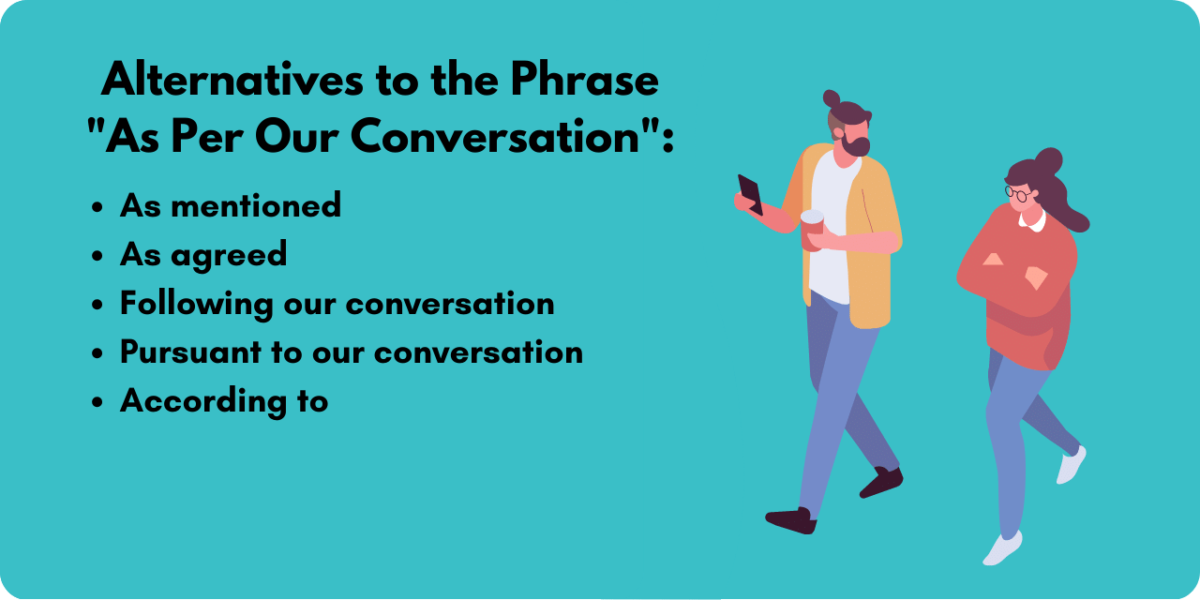Nobody wants to be known as a boring conversationalist, and one way to avoid that reputation is to steer clear of predictable speech patterns. Do you overuse the phrase “per our conversation?” Here are five less frequently-used variations to try out!
- As mentioned
- As agreed
- Following our conversation
- Pursuant to our conversation
- According to

Now let’s get into the nitty-gritty of it:
Want to give credit for an idea?
As Mentioned
Saying “per our conversation” indicates to listeners that a conversation took place in the past. However, it doesn’t cover who said what. By inserting the speaker’s name, you can cut back on potential confusion. The phrase “as mentioned” gives you a chance to specify the speaker. Take a look at these examples:
- As I mentioned, Monday’s meeting is going to cover the principles of effective communication.
- As the contractors mentioned, the mold in the bathroom needs to be addressed as soon as possible.
You can also use “as mentioned” without pointing out the speaker if there’s no need to keep track of who said what in a previous conversation.
- As mentioned during yesterday’s meeting, you’ll be responsible for bringing chips and dip to the party.
Want to provide a reminder?
As Agreed
In many cases, emails that contain the phrase “per our conversation” are meant to remind others that they said they would do something. To better achieve this goal, use the phrase “as agreed.” This expression is particularly useful for reminding various people of their obligations in a contractual agreement.
- As agreed, your catering company is expected to serve appetizers at 5 PM.
- As agreed, the period for contract revision will end on December 31, 2021.
Want to explain the results of a conversation?
Following Our Conversation
Have you ever been a part of a conversation that revealed shocking information and found yourself thinking, “Well, that changes everything?” To indicate the effect of newly-discovered details, the phrase “following our conversation” comes in handy. Check out the examples below:
- Thanks again for the interview on Friday. Following our conversation, I’ve realized there are a couple of things I wanted to ask you about that we didn’t have time to cover.
- Following our conversation, the owner of the company recommended that the current marketing manager be replaced.
If the phrase “following our conversation” feels a bit too formal for you, you can use a more casual term like “talk,” “chat,” or perhaps even “convo.” In legal contexts, however, you might run into even more formal ways of saying “following our conversation.”
In Pursuance Of/Pursuant To Our Conversation
There’s likely a verb that comes to mind when you read the words pursuance and pursuant: pursue. These three words have the same root and similar meanings. Pursuance refers to carrying something out or executing something. Meanwhile, pursuant means “in accordance with.” You can use “in pursuance of” and “pursuant to” when an action takes place as a result of a discussion. Take a look at the example below:
- Pursuant to our conversation, I have enclosed a rough outline of the article content for your review. If the outline meets your approval, please return it, along with the down payment for the article, in the envelope provided.
Note that these two phrases are not considered appropriate for non-legal correspondence since they’re quite formal. Think about it: Would you use the phrase “pursuant to our conversation” in real life, while having coffee with a colleague, for example? There aren’t too many people who would. But if you’re an exception to the rule, it might still be best not to risk using these two options just for the sake of variety.
Want to summarize something that’s been said?
If you want to ensure both parties understand each other, or if you’re looking to create a record to refer to later on, summarizing a conversation is essential. In this case, the simple phrase “according to” is best suited for recapping a conversation.
According To
- According to our conversation, the following updates will be set in motion on August 31:
-
- The new website will go live.
- Employee discounts will increase from 15% to 20% of the sales price.
- We will implement a casual dress policy on Fridays.
Did I miss anything?
- According to our conversation, assignments will be due at the end of the workday until further notice.
Need another reason to avoid using the phrase “per our conversation”? According to The Handbook of Technical Writing, the word “per” is considered jargon when used to mean “according to.” What is your go-to phrase? Will you mix up your usual speech patterns with one of these five new phrases today?
Further reading:
5 Unique Ways To Say “It’s Nice To Meet You” In Your Writing






